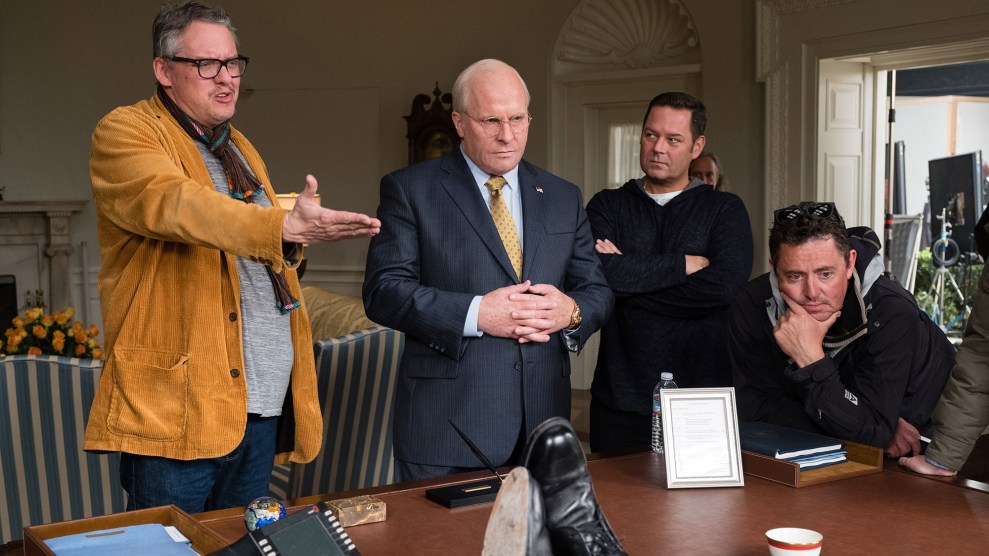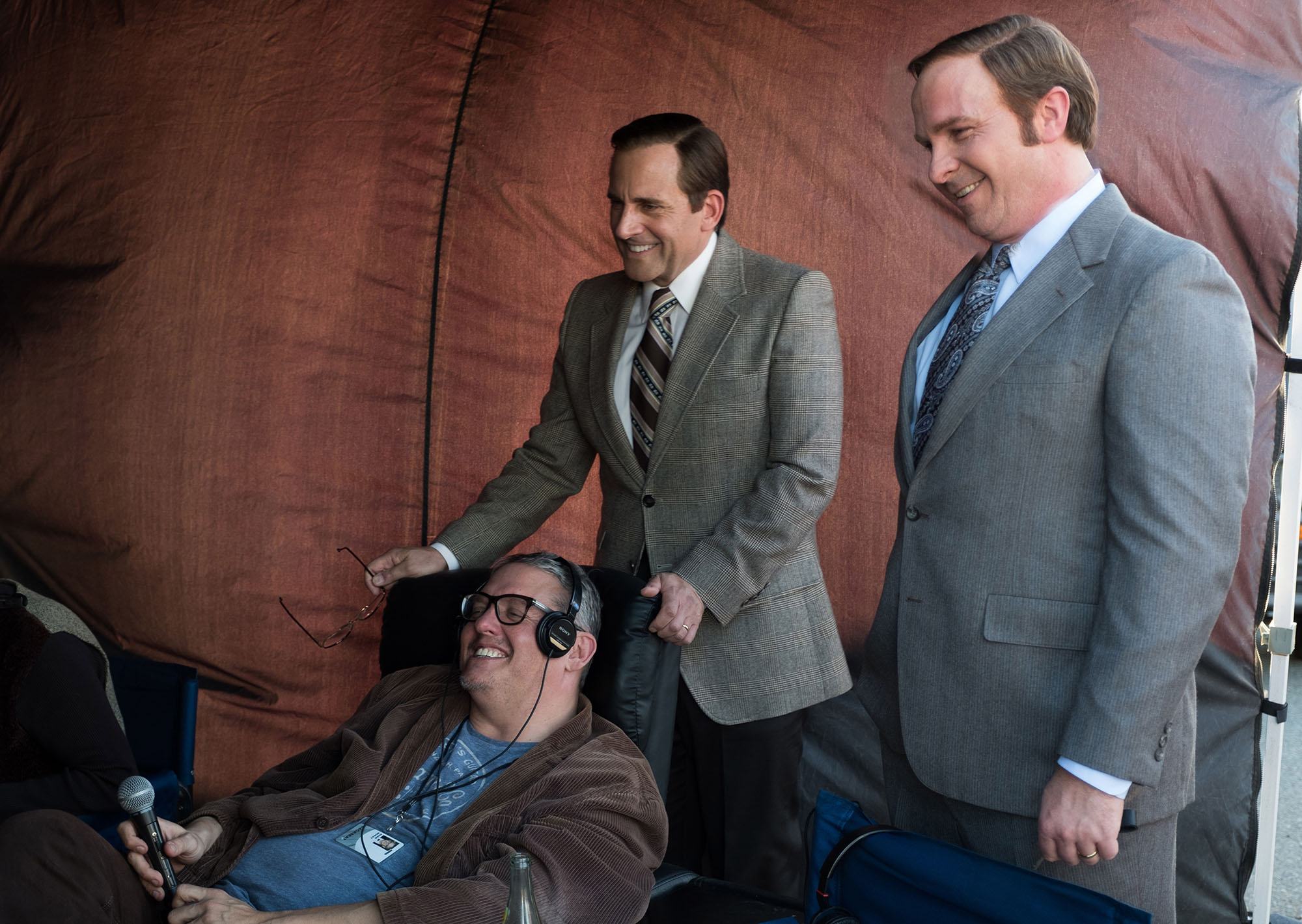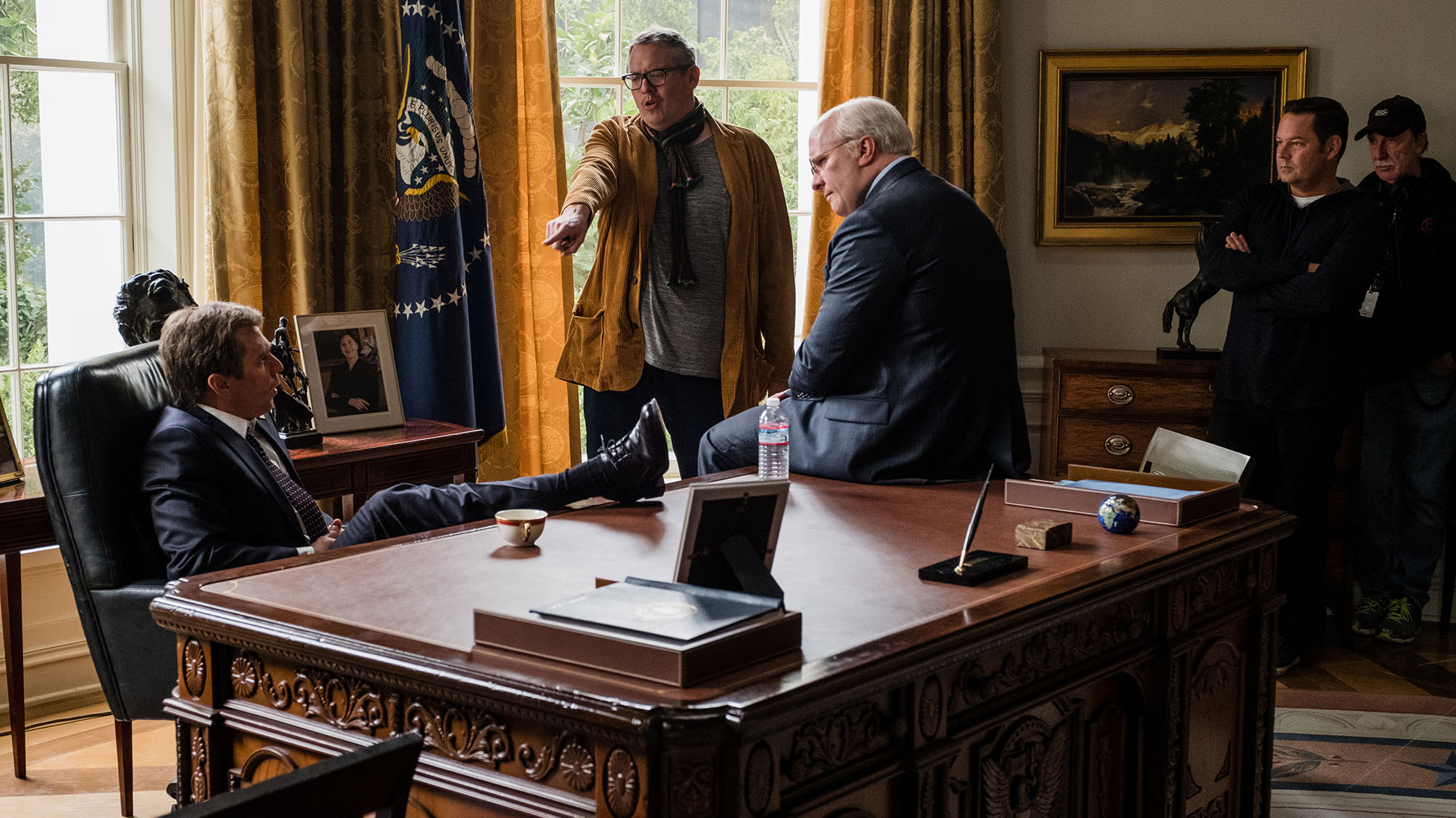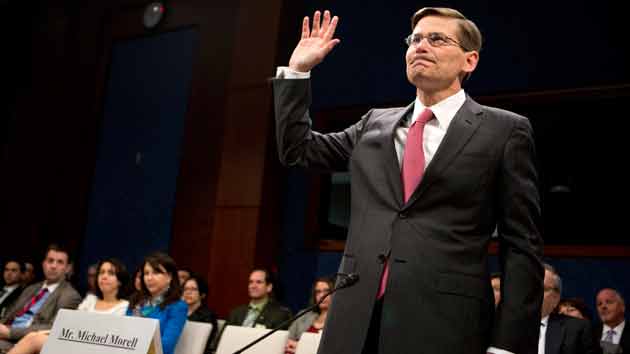
Director Adam McKay and actor Christian Bale as Dick Cheney on the set of "Vice"Matt Kennedy/Annapurna Pictures
For millions of Americans, Donald Trump’s reign in the White House has been a nightmare. Enough so that for some, the George W. Bush years don’t look so bad. But filmmaker Adam McKay doesn’t share this view. The director and co-writer of The Big Short hasn’t forgotten Bush’s tax cuts for the wealthy, the sold-with-lies Iraq War (and the US troops and Iraqi civilians who died because of it), waterboarding, other torture, Gitmo, the economic meltdown, and the lack of climate action. And he certainly hasn’t forgotten Dick Cheney.
With his new feature film, Vice, the onetime head writer of Saturday Night Live and longtime collaborator of Will Ferrell has subjected the former veep to what now might be called the McKay Treatment: a sardonic blend of drama, comedy, sarcasm, surrealism, and snark. The deeply researched movie is ostensibly a biopic of Cheney, covering his improbable rise from a Wyoming ne’er-do-well to the most conniving and consequential No. 2 in US history. But the movie—which shifts back and forth between clever farce and serious-as-a-heart-attack tragedy—is also a contemplation of power and the lust for it. Vice truly fits the “you’ll-laugh, you’ll cry” bill.
But do American audiences want to guffaw and/or sob about Cheney, played immaculately by shape-shifter Christian Bale, and the appalling atrocities committed by him and that guy from Texas who hired him? McKay spoke to Mother Jones about this, post-postmodern filmmaking, the unitary executive theory, the time Cheney made a surprise phone call to Bill Clinton, and more.
Mother Jones: At the moment, it seems the nation is confronting the existential crisis of Trump in the White House, at least from a progressive perspective. So why did you choose to focus on Cheney?
Adam McKay: I got the flu a couple years ago and was homebound for two weeks. And you do that thing where you look at your bookshelf and pluck a book out that you haven’t read. Somebody gave me a book on Cheney years ago. I’ve just always been fascinated by him. We all knew the jokes about him— like shooting a guy in the face, and he’s the puppet master. But I didn’t know any real specifics. So I started reading it, and it occurred to me that though there had been critical books written on Cheney, this guy was sailing off across the horizon. And then there was a TMZ clip of him in his SUV kind of laughing, and it seems like he’s become an actor from an ’80s sitcom, beloved but cranky. It was so weird, because I’d lived through that [Bush-Cheney] era, and it was so extreme. They invaded a nation, and crossed the line on the Geneva Convention. All these huge things happened. So I just kept reading and reading. What I found was that the depth of his control, the depth of his brilliance as a bureaucratic power master, was way deeper than I thought. I also found the family side to be fascinating—the fact that he was an average Joe from Wyoming. And the whole thing started smelling like an American epic to me. And the baseline of this entire story is the rise of the Republican Party, the Reagan Revolution, and how it leads us directly to where we are right now. I said I’m gonna try to do a portrait of this man that becomes a portrait of a country and a political party. It was the most researched, intensive script I’ve ever worked on.
MJ: I know Cheney is the main character here, but is the film also a rebuff to what might be an ongoing PR rehabilitation of Bush? After all, Michelle Obama recently said about W, “I love him to death, he’s a wonderful man, he’s a funny man.” Does that view need to be countered? Does America need a reminder?
AM: Bush and Cheney were never taken to task. Our country didn’t have the stomach to go back and prosecute and investigate. So the only other alternative was to see Bush as a kind of bumbling, funny, big kid and Cheney as a cranky, surprisingly funny guy. That’s what they’ve become. And I’m astounded every time I see someone say, “God, it makes you miss W. Bush.” I would say, “No, what are you talking about?” It was a little bit sickening. The image of George W. Bush dancing on The Ellen DeGeneres Show is one I keep thinking about. Please link to it, because it reminds me of the movie The Act Of Killing, where these guys who massacred people are on talk shows and being treated like they’re semi-celebrities.

Adam McKay, Steve Carell, and Christian Bale on the set of Vice
Matt Kennedy/Annapurna Pictures
MJ: The end titles of Vice note that the Iraq War led not only to the deaths of 4,500 American soldiers but to the deaths of 600,000 Iraqi civilians. That’s a point that’s seldom made when Iraq, Bush, and Cheney are discussed. In the film, you showed, even if briefly, the human consequences of that war. Was that one reason you wanted to do this film?
AM: It is a key element of it. We wanted to show that in these boring offices and hallways in government buildings, decisions are made that immediately ripple out to bombs concussing and liquefying people’s internal organs and other horrors that you can’t imagine. There is a scene in which [former Secretary of Defense Donald] Rumsfeld points to the door in the Nixon White House and tells Cheney, “Hey, you know what they’re talking about in there? They’re talking about bombing Cambodia.” That was the Rosetta Stone for what we wanted to do throughout the movie. You see this uncharismatic bureaucratic vice president in a monotone voice say these things, and then you go to an Iraqi family cowering under their table as their town is being destroyed. We definitely made an effort to show that contrast. We didn’t spend tens of minutes doing it, but we wanted to make sure that was an element in the film.
MJ: Was it hard to do a film about war and torture that had a comical and sardonic edge to it? How did you puzzle that out?
AM: We live in such unusual times. The example I always cite is Trump standing in the forest with [former California Gov.] Jerry Brown and [California Gov.] Gavin Newsom and saying the problem with the forest fires is we have to rake the forest. Is that moment funny? Is it horrifying? Is it grotesque? I honestly can’t answer that. My experience with the Bush years was that they were horrifying, they were ridiculous, they were cartoonish, they were dispiriting. We wanted to put all that in. So some people are confused by the tonal shifts in the movie, but they’re very intentional. The way we live now is that you see beautiful kids being put into cages for no reason other than sadism and feeding a political base that wants blood, and then you see Melania [Trump] dressed like a character from Indiana Jones standing in front of the pyramids. And behind it all, you have global warming breathing down our neck, the biggest story in human history. In the movie we tried to reflect that, and we purposely said this movie is sometimes going to be dramatic, it’s sometimes going to be tragic, it’s sometimes going to be ludicrous. For some audiences, it’s hard. And for other audiences, they love it, they feel that it is very true to our times.
MJ: This does feel like a post-postmodern stage.
AM: We need a new word for postmodern, because postmodern almost looks quaint at this point. I would call this, “Throw postmodern in the blender, add tequila, and chug it.” It does feel like the civilization that we’ve lived in for the last 150 years has run out of gas and there’s this giant reorganization clearly coming. That’s why this film does have an experimental quality to it.
MJ: Was it tough to do a biopic about a character no audience member will be rooting for? In The Big Short, we were rooting for the hedge fund guys and the investors who saw the coming collapse of the housing market. We wanted them to win. That’s sure not the case with Cheney.
AM: What was key to me—from all the research we did—was that Cheney started as a pretty normal guy. The impetus for his ambition was that he was crazy about the beautiful baton-twirling, blonde, straight-A student Lynne Vincent [played by Amy Adams]. I felt that Cheney represented an arc that has happened in America, where he went from the guy who wants to make good and make his wife proud to someone with a quest for power and control, for both him and Lynne. I feel like he and Lynne are almost the same person—that Amy Adams and Christian Bale are kind of both playing Dick Cheney. Was it hard? Absolutely. But the family was key. I dug into what had happened with his daughter Mary. That to me is when the personal story became a grand tragedy. The wedge issues that the Cheneys had used to gain power broke his family apart. It made me sad for the guy, which I never thought I would feel.
MJ: That is a moment in the movie when you almost feel sorry for Dick Cheney.
AM: I think that’s great. If he’s just a sociopath, it’s game over. In 2009, when I directed Will Ferrell in his one-man Broadway show on Bush, he and I had lunch with Bill Clinton. And I said to him, “What do you make of Dick Cheney?” He said after he had his heart attack, he got a call that said, “It’s Dick Cheney.” And Clinton was like, “Really?” And Cheney got on the phone, and he says, “Hey, I just wanted to wish you well. I’ve been through it before. I know how hard it is. Hope you’re doing well. I hope your family is doing well.” For about 20 seconds, it was almost a warm conversation. Then Clinton said Cheney shifted and suddenly got cold, went into a pitter-patter monotone, and got off the phone as quick as he could. So yeah, feeling a little bad for Cheney in the end is good. I think there is a little part of him that realizes what he gave away. He’ll never admit it.

Adam McKay directs Sam Rockwell, playing George W. Bush, and Christian Bale.
Matt Kennedy/Annapurna Pictures
MJ: At the end of the film, there’s a montage that seems to imply that Cheney is to blame for the opioid crisis, the economic meltdown of 2008, the rise of Trump, climate change—
AM: No, no, no.
MJ: —mass shootings in high schools, and more. And I hate myself for asking this, but is that fair?
AM: No, no, we’re not doing that. No, what we tried to do was talk about choices and actions and how they ripple. So in the end, when we show where we’re at today, the idea is that it’s not all Cheney’s fault. Some of it is; the Syrian refugee crisis certainly you could put on him. What we’re trying to show is that the Republican Revolution that used Fox News begat Alex Jones. And that the opioid crisis, the shootings—they’re a result of the failure of government, and that there is now a cynicism about government.
MJ: Also near the end, Cheney says to the audience, “You chose me, and I did what you asked.” Putting aside the fact that he was not chosen by a majority of the electorate in 2000, is this a moment of sympathy for Cheney? Are you saying that ultimately the American people—who did give him a majority victory in 2004—are to blame for Cheney and his manipulations?
AM: That’s one of my favorite moments in the whole movie, because everyone has a different response to it. Christian felt like he needed to say what Cheney believed. As an actor, Christian’s job is to believe in the character, become the character, feel the character is right. And he told me, “Why not get one moment where he turns to the camera and says his side.” I was like, you’re one of the great actors in the world, so sure, let’s do a scene. We shot it, and Christian said, “What do you think?” And I said, “I think that’s the most terrifying thing I’ve ever seen.” And he goes, “Oh, then I failed.” I said, “No, that’s just me.” My take on this is that when he says, “You chose me and I did what you wanted,” he’s not talking to the American people, he’s talking to power. He’s a servant to power. I think he thinks he’s talking to the American people, but he’s really talking to power. And that’s why I got chills in that moment. I’ve heard some people say, “Well, you know, he is kinda right.” And I say, “You know, if you just watched that whole movie, and you hear him say that in the end, and you still think he’s kinda right, God bless ya.” Most people know it’s bullshit, most people know that the “I kept you safe” kind of thing—after everything you’ve just seen—is a bit hollow. Did you get the willies when he turned toward the audience?
MJ: I thought it was creepy.
AM: That’s exactly what it was supposed to be.
MJ: James Mann, a journalist who covered the foreign policy establishment of the Bush-Cheney years, had a criticism of the film. He pointed to a scene in which a young Cheney asks Rumsfeld, for whom he’s working at the time, what they believe in. Rumsfeld laughs at the question, indicating that the obvious answer is nothing but power. And Mann raised this question: Does this interaction suggest that Cheney and Rumsfeld were not ideologically driven and not propelled by bad ideas, such as their naïve belief they could reshape the Middle East? Was it truly only about power for power’s sake?
AM: I would say yes, that’s what it suggests. I’m actually gonna write a piece in rebuttal to what Mann wrote, because I strongly disagree. I read his book, Rise of the Vulcans, a great book. I’m familiar with the neocons’ Straussian justifications for what they’ve done, the mission statement of the Project for the New American Century [a neocon outfit that had advocated US military action against Iraq in the years before 9/11]. My takeaway when I read all of that was that this is claptrap. This is ideology pegged to action after the fact. These guys had gotten to know each other through the ’70s, ’80s, and ’90s—Rumsfeld and Cheney, and [Paul] Wolfowitz, too.
They were known as a couple of throat-slitters. Their ideology flipped and changed so much. Rumsfeld was kind of against the Vietnam War when he was with Nixon, because he was countering Henry Kissinger’s power. Then when they were at the Ford White House and Kissinger wanted a missile treaty [with the Soviet Union], suddenly Rumsfeld and Cheney were hawkish. When Cheney was secretary of defense for George H.W. Bush, he was against going into Baghdad. But then someone caught Cheney in a room researching tactical nukes for use in Iraq. You look at Cheney’s introduction to the Laffer curve [the basis for supply-side economics] in the ’70s. When he met [conservative economist] Arthur Laffer, he says this is ridiculous. Lo and behold, later on, the Republicans decide, hey yeah, let’s ring up deficits, give tax breaks to the rich. And what does Cheney tell Paul O’Neill [the Treasury secretary for George W. Bush]? Reagan proves deficits don’t matter. I could go on and on. Everything I found was full of inconsistent ideologies. So I had a strong reaction to what Mann argued. I think it’s dangerous to imbue them with an ideology. It’s the equivalent of saying like, “Oh that guy who sleeps during the day and drinks blood? He’s kind of a bio-Darwinian.” No! He’s a vampire!
My theory on Cheney was much more aligned with Robert Caro and his book The Power Broker [the masterful biography of Robert Moses, the ruthless and notorious official who oversaw public works in the metropolitan New York area]. I feel our country doesn’t talk enough about the physiological effects of unchecked power on a human being. There’s been numerous studies that show it changes people. And that’s the big change that Cheney underwent. I don’t think it was the heart attacks. This was a guy who loved the idea of the unitary executive theory [the notion the president has unlimited power] back in the ’70s, when he heard about it from Antonin Scalia [who was then an official in the Justice Department]. So I disagree with Mann. He went so far as to call our movie dangerous because we didn’t acknowledge that. And I would say it’s dangerous to give these guys the credit of an ideology.
MJ: At the start of the movie, the narrator notes that for many Americans—especially those hard-pressed by economic forces—when it comes to entertainment, the last thing we want is complicated analysis. Yet you, Adam McKay, wrote and directed a movie that aims to be entertaining and that is full of complicated issues and events. How do you square that? Or what were you thinking?
AM: Let me make this very clear. When I joke about people being entertained to death, I’m a part of that. I mean, I made Talladega Nights. But what I’m referring to is this: There is a technique we’ve seen used in fascist dictatorships and fallen states. You work the people so hard that they don’t have time to engage. Sometimes I come home after working a 14-hour day, and I just want to watch Forensic Files and eat Taco Bell. We get tired.
MJ: But Vice is full of complicated issues and events and still aims to be entertaining and funny.
AM: I dive into these subjects with every movie. I read and read and read. I get excited. I find interesting information. We did interviews. And certain things light up for me. They’re cool. Or they’re cool for me because I’m into it. But when I tell my 18-year-old daughter or a friend about the unitary executive theory, their eyes glaze over. I’m like, “Wait a minute, don’t you understand what the unitary executive theory is?” So I want to convey that excitement. I’m going to use pop culture.
Pop culture is telling you to eat the cheeseburger or buy whatever, but actually the color they’re using in pop culture should be used on this. Because the unitary executive theory is insane, it’s crazy, it’s fascinating. That’s why I put in a clip of Galactus and a lion catching a gazelle when explaining it. That’s where the bright lights and the effects should go. Sometimes those evil tools of entertainment are used for distraction. They can also be used to engage and excite. I get so excited about this stuff. Holy crap, Roger Ailes was working in the Nixon White House and was then pushing a conservative news network? What percentage of Americans knows this? When I found this out, I was blown away by this fact. So we get that stuff in there. I mean, we definitely went for it with this movie. This is far from a cool or removed movie. This movie is waving its arms and showing its armpit stains. And I’m glad we did that.
















